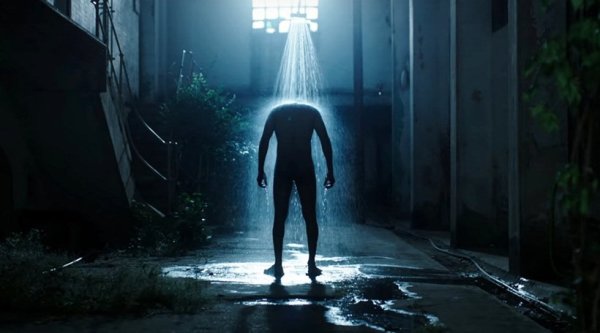 Psycho is streaming on Netflix.
Psycho is streaming on Netflix.
Director Mysskin’s Psycho opens with a homage to Alfred Hitchcock, the creator of the first Psycho that struck terror in the hearts of people across the world. Hitchcock achieved great shock-value when Janet Leigh’s Marion Crane is mercilessly stabbed in the iconic shower-scene, 45 minutes into the movie. She was supposed to be the main focus of the film. Hitchcock’s trick created an incredible effect on the viewers.
Mysskin, however, begins the movie with the ‘shower-murder.’ We hear screams of a terrified woman as a man briskly walks through a dimly-lit hallway. He steps into a vault, we see he’s dressed for the wet-job. The woman is still screaming. And we see her terror-ridden face. She is strapped to a stretcher, that can be declined at the head, perfectly exposing the tender portion of the neck for easy execution. With a single stroke of his blade, the ‘psycho’ decapitates the woman. We see his face, we know who he is. Now, where is the thrill in it? Where is the suspense, man?
Mysskin doesn’t pay homage to Hitchcock by borrowing the premise or mimicking Psycho. He does it through adopting Hitchcock’s ‘bomb theory’ to create suspense. He shows us the bomb in the very beginning and then moves the camera to the ticking clock.
Mysskin aspires to achieve multiple things with Psycho, not just provide a mere edge-of-the-seat horror experience, which makes you watch the movie through the gaps between your fingers. The movie is a social commentary on various matters starting from its effort to expand the definition of a psychopath.
A popular radio-jockey Dahini (Aditi Rao Hydari) interviewing a psychiatrist asks what’s the difference between a psychopath and a serial killer? The doctor simply puts, “Both are the same. Any human who kills another human for any reason loses the ability to be human any longer. The person becomes a psychopath.”
Now, that is a very keen observation from the director, who also wrote this film. For so long, people who commit crimes like murdering inter-caste couples, or lynching people in the name of caste, ideologies, and religion were seldom defined as psychopaths in our movies. This observation is a revelation, indeed.
 Mysskin doesn’t pay homage to Alfred Hitchcock by borrowing the premise or mimicking Psycho.
Mysskin doesn’t pay homage to Alfred Hitchcock by borrowing the premise or mimicking Psycho.
Mysskin also challenges the notion that deems disability as a weakness. Dahini has a die-hard follower in Udhayanidhi Stalin’s Gautham. He is blind, and the only way he sees the world is through his mind’s eye. When Dahini is kidnapped, Gautham spots more clues that escape the eyes of the cops. “He sees through his mind,” responds the investigating officer Muthu, played by Ram, when his superior berates him for being outsmarted by a blind person.
Not just the cops, nobody in the city seems to see the serial killer, who blatantly kidnaps women in broad daylight, kills his victims at parking lots and he even doesn’t prefer a mask. He moves around the city undetected as people are so distracted by unwanted things, they don’t know what’s happening around them. Maybe the director wants to say something about a TV-addicted, binge-watching generation.
Gautham teams up with a former police officer Kamala (Nithya Menen). She is suffering from quadriplegia after falling down the stairs while investigating the serial murders in Coimbatore. Yet again, Mysskin avoids the typical choice of Chennai as the backdrop for the crime story. Kamala is confined to her motorized wheelchair and fully depends on her mother Vasantha (Renuka), who also doubles up as her punching bag. There is also Gautham’s middle-aged caretaker, whose only strongest suit is loyalty. Now, it is left to this team of individuals who are deemed weak by popular definition to track and take down a serial killer, who is smart, strong and determined. In the meantime, the cops are busy losing sleep, mind and interest in life.
Mysskin, however, provides an unpopular observation about the serial killer. He humanizes the psycho, who has been beheading young women, desecrating their bodies in public and keeping their heads as trophies. He presents the serial killer as the byproduct of all the evils of society. Everybody has contributed to creating such evil among us.
In addition to the heavy subtext, Psycho is also a visually appealing movie. There are a few elaborately designed set pieces that involve some solid physical acting from Rajkumar Pitchumani, who plays Angulimala aka the Psycho. Maestro Ilaiyaraaja’s symphony and Sid Sriram’s vocals are unnerving and soothing at once.
Psycho is streaming on Netflix.